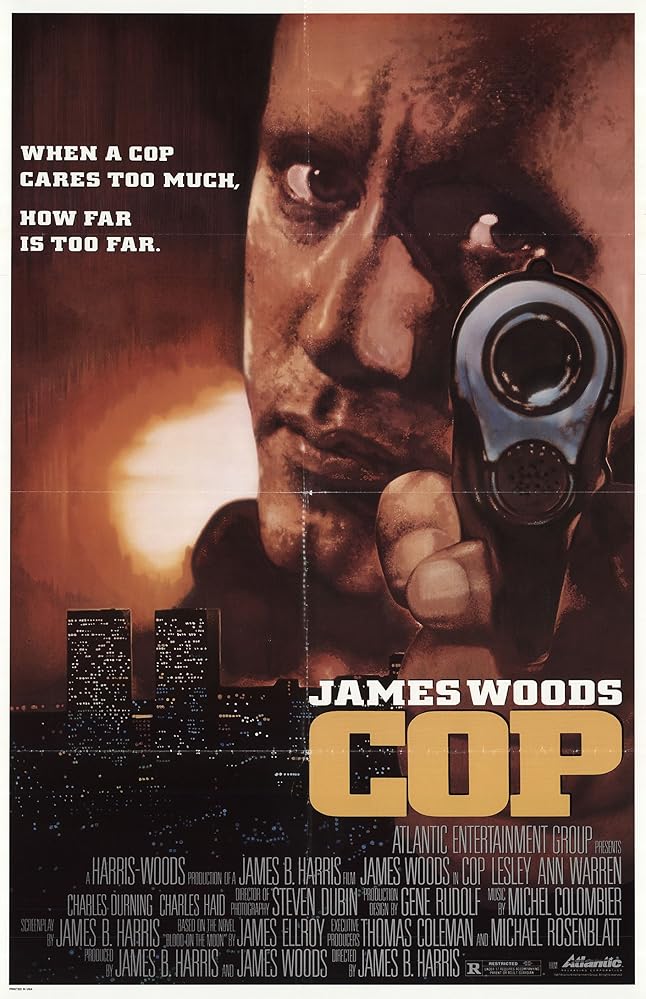
COP
(director/writer: James B. Harris; screenwriter: from a James Ellroy novel “Blood on the Moon”; cinematographer: Steven Dubin; editor: Anthony M. Spano; cast: James Woods (Lloyd Hopkins), Lesley Ann Warren (Kathleen McCarthy), Charles Durning (Dutch Peltz), Charles Haid (Whitey Haines), Randi Brooks (Joanie Pratt), Raymond J. Barry (Capt. Gaffney), Steven Lambert (Bobby Franco), Vicki Wauchope (Penny Hopkins), Jan McGill (Jen Hopkins); Runtime: 110; Atlantic; 1988)
“An exciting, well-acted but somewhat muddled thriller.”
Reviewed by Dennis Schwartz
An exciting, well-acted but somewhat muddled thriller set in LA. Sergeant Lloyd Hopkins (James Woods) has trouble at home from his wife and trouble at work relating to his captain. Hopkins becomes obsessed with a murder case involving a woman whose body he finds hanging from the ceiling in a mutilated condition. Hopkins believes he is after a serial killer, but his theory that the killer has a long history of murdering innocent women is not accepted by his department.
The film tries to make a statement about how sexual innocence both corrupts and kills — that one’s sexual expectations will lead to the greatest disillusionment. James B. Harris has adapted this film from the novel “Blood on the Moon” by James Ellroy, but he butchers his feminist theme with some dastardly comments about those in the movement. But it is through Woods’s quirky performance as he battles the Born Again Christians who are his bosses and the naive views of some innocent women who are unprepared for life’s harsh realities, that gives this film its magnetic pull.
Coming home after a day at the gruesome crime scene Hopkins tells his lovely eight year old daughter (Wauchope) stories about the busts he made as a cop, which irritates his wife (Jan McGill). So much so, that the next day she takes the kid with her to S.F. and tells Hopkins it’s all over between them.
Hopkins is considered a good cop because of his high arrest record, but he’s also considered a loose cannon. His immediate superior is the politically adept Lt. Dutch Peltz (Durning), who goes along with his friend’s hunches. On an unauthorized stakeout based on another phone tip Hopkins kills a man not involved in the murder, but who acts suspicious and disobeys police orders to freeze in his car and knocks Dutch over when trying to flee. Hopkins picks up his luscious hooker date and leaves Dutch alone to clean up the mess.
Puzzled by the victim’s collection of books, especially one titled “Rage of the Womb,” Hopkins starts looking into other unsolved crimes against women he considers innocent looking. Hopkins scours the photos he sees in the police files over the last 16 years of dead women and discovers odd coincidences, such as the dates of their crime seem to match a time the killer always strikes. He decides to follow up the investigation by revisiting these closed cases. His department captain (Raymond J. Barry) refuses to go along with his theory, saying it would look bad for the department if he was right and they never fully investigated all those closed cases. So he’s stuck in a Dirty Harry role, sticking his neck out to do what he believes is right.
Hopkins interviews Deputy Sheriff Haines (Haid) because he is suspicious that he found two of the victim’s bodies and he sloppily reported them as suicides. Hopkins has a bad feeling about him, sensing that he’s a sexual pervert and returns to illegally search Haines’s apartment. Hopkins finds that Haines’s apartment is bugged and that he’s involved in running the homosexual prostitute trade in his West Hollywood beat and he gets him to confess to this, as he is wired and gets everything said on tape.
The trail to the killer will lead Hopkins to interview a classy prostitute Joanie Pratt (Brooks), who invites him over for a freebie. Joanie will soon turn up brutally slain in her apartment with her blood splattered all over in the form of written messages. Hopkins’ department receives a photo of him having sex with her on the kitchen counter-top, the same place her mutilated body is found.
A diary note on one of the victims telling where she purchases her books leads Hopkins to track down a feminist poet and bookstore owner, Kathleen McCarthy (Lesley Ann Warren). McCarthy went to the same high school he and the deputy sheriff went to. Hopkins also learns that McCarthy was a virgin who was gang-raped in high school out of revenge for flaunting her innocence, something that has left her still traumatized. When Hopkins searches her apartment, he is surprised that she receives flowers on the day one of the unsolved murders took place, with a poetical note also included by the anonymous sender. Hopkins now believes the events of that rape have set the killer off, but he now must convince McCarthy to help him and to get his department to back him. But Hopkins is only rewarded for his diligence by the department suspending him, because wherever he is dead bodies are popping up.
Cops is a no-holds barred, mean, and brutally frank film that loses its edge in explaining the theme behind the story, but never fails to be reaching out at evil. James Woods is energetic as someone who can be thought of as either just obsessed with his work or someone in dire need of psychological help. Flaws and all (the story was thin and unbelievable) it’s still a rather provocative film that grabs your attention, even though it can’t clarify what it is all about.
REVIEWED ON 2/14/2001 GRADE: B-